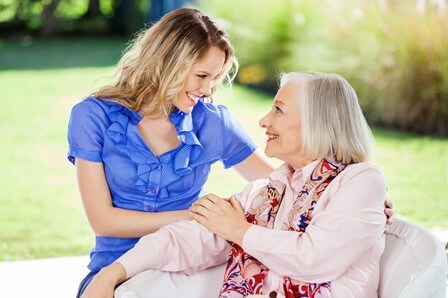
Fall Proofing Your Home
October 11, 2016
Protecting Seniors at Home from Scams
October 26, 2016This article discusses the importance of elderly parents choose to live at home and what you’ll need to know. Many elderly people decide to remain in their home as they grow older, because it gives them more freedom, privacy, independence, and comfort than an assisted living facility. While doing so can give them a better quality of life, it also raises some significant challenges.
As they age, an elderly person will experience a deterioration of both their physical and mental abilities. This deterioration can make common tasks difficult to perform and may negatively impact their lifestyle. They may even reach a point where their home is no longer a safe environment unless they receive help from a caregiver.
For the children of elderly parents living at home alone, it can be difficult to understand if their parent’s needs are being met. This article will highlight some important issues to help you ensure your parent is safe and comfortable in their home.
Are they eating well?
It is essential for older people to eat a balanced and nutritious diet. Their diet should be rich in vitamin D, Omega-3 fatty acids, Vitamin B12, Folate/Folic acid, B6, Calcium, Potassium, Magnesium, and fiber. If they fail to receive adequate nutrition from their diet, they will be prone to contracting certain illnesses and their condition will quickly deteriorate.
Going grocery shopping and cooking nutritious meals can become difficult for an elderly person. As they become older, they may find it difficult to drive their car or take public transport to the local grocery store. The act of preparing a meal can also become arduous for older people, particularly if they suffer from a serious health condition like emphysema or congestive heart failure.
Your parent may require someone to do the grocery shopping on their behalf. They may also need someone to help them prepare meals or to deliver pre-cooked meals. Your parent may also benefit from some guidance as to what foods they should include in their diet.
Is their home a safe environment?
Most people consider their home to be the safest place in the world. Unfortunately, the family home can become a dangerous place for an elderly person. Most homes contain a number of trip and slip hazards which can cause an elderly person to fall. They are also designed with able-bodied people in mind. An elderly person no longer has the flexibility required to reach certain items or move around the house with great agility.
Some of the basic changes that may be required around the home include:
- Installing grab bars in the bathroom
- Lowering shelves so your parent can comfortably reach the items they use
- Moving heavy items to a lower shelf
- Removing trip hazards like area rugs, and electrical cords that are stretched across walk ways.
- Adding more lighting and light switches to the home so your parent can safely move around
- Add night lights throughout the home
- Putting in a security system so your parent feels secure
- Installing a handheld shower and bath seat
- Install a raised toilet seat
- Installing a personal emergency response system in case they fall or slip and can’t get up
- Placing additional phones throughout the home and near their bedside
- Widening doorways to accommodate walkers or wheelchairs
Are they equipped to deal with emergencies?
If your elderly parent has a fall in their home or experiences a serious medical problem, they will need to have help close by. If no one is available to help them, it could quickly become a life-threatening situation.
Elderly people living alone should use a personal emergency response system (PERS). These systems allow an elderly person to press a button to instantly notify emergency services and their loved ones that they require help. Mobile systems are also available, which transmit your parent’s GPS location to emergency responders.
The home should have a security alarm system in place and your parent should have easy access to a telephone at all times. You may also wish to install a camera monitoring system which allows you to check your parent is safe in their home.
Can they handle their medical affairs?
It is important that your parent makes it to their doctors’ appointments and does not delay obtaining treatment for any health conditions. They must also have easy access to their medications and understand the correct dosages they should be taking.
They may require help with transportation to appointments, picking up medications from the pharmacy, and for taking the correct dosage of their medications.
Their doctor may also recommend your parent performs exercises or specific forms of rehabilitation. Your parent may require assistance to perform these exercises.
Are their emotional needs being met?
Living alone can be lonely — particularly for a person who is housebound. Elderly people who are lonely have shorter lifespans and are more prone to mental health disorders like depression.
You should ensure that your parent can maintain an active social life and continue their hobbies and interests. They may require transportation to social events or help purchasing the items required for their hobby.
How Home Care Can Help
It can be difficult to constantly be available for your parent and make sure they have everything they need. That is why so many people hire professional caregivers to help their parents. Caregivers can assist your parent in many ways including:
- Domestic duties around the home
- Transportation to doctor’s appointments and social events
- Companionship to your parent
- Preparing nutritious home cooked meals
- Grocery shopping and errands
- Medication reminders
- Exercises or rehabilitation assistance
If you are interested in learning more about elderly parents choose to live at home and how All Heart Home Care can help, contact us today at 619-736-4677. We offer free in-home consultations and can explain all of the benefits obtained from using a home care service!








